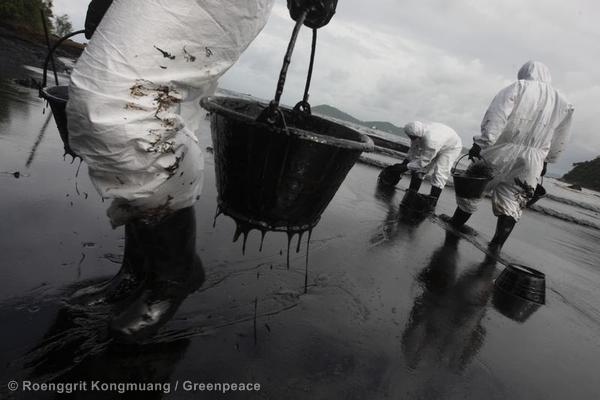Environmental pollution goes hand in hand with oil drilling.
The 2010 BP Deepwater Horizon disaster dumped more than 200 million gallons of crude oil into the Gulf of Mexico, leading to a wave of wildlife deaths and harming the local economy. While that spill was notable for its size, it wasn’t a one-time mistake.
The oil industry’s global track record shows that blowouts and oil spills are a fact of life where oil is drilled — from large spills like the 1989 Exxon Valdez accident to smaller and more frequent events that don’t always capture global attention.
After decades of environmental damage, the fossil fuel industry still hasn’t learned its lesson.
We’re forcing them to face the facts.
The Problem With Oil: Global Warming
Burning oil releases carbon dioxide into the atmosphere, contributing to the warming of our planet. In 2013, petroleum accounted for 41 percent of the U.S.’s carbon dioxide emissions from fossil fuels.
In order to avoid the worst impacts of climate change, scientists say the world cannot afford to burn more than one-third of known oil reserves. The same study also found that 100 percent of Arctic oil and gas must be left in the ground to limit catastrophic temperature rise.
Drilling Means Spilling
Oil spills are a mess wherever they occur, but history shows that oil spilled into the ocean or other waters is impossible to fully clean up.
Once oil is spilled into marine environments, it is extremely rare to recover more than 20 percent of the oil, even in ideal conditions. Despite massive and expensive responses, the mechanical recovery rate of surface oil was only 8 percent for the Exxon Valdez spill and 3 percent for the Deepwater Horizon.
Drilling in the fragile Arctic — something oil industry giants like Exxon and Shell are eager to do — is an especially bad idea. Recent studies have shown that harsh Arctic conditions would make it impossible to effectively respond to a spill during most of the Arctic drilling season. Given that the oil industry does not have the technology to clean up after itself, drilling presents tremendous risks to the people and environment of the Arctic.
A ban on all new drilling is the only way to avoid another oil disaster.
What Keeps the Oil Industry Alive, Anyway?
If oil spills are wreaking environmental havoc, the threat of climate change is growing every day, and clean, renewable alternatives are available, why does oil still provide 40 percent of the world’s energy?
Fossil fuel companies are spending billions out of desperation to keep it that way, that’s why.
Oil companies pour millions of dollars into political campaigns, propaganda and lobbying so that they can delay progress on renewable energy and ensure their own profits. In 2014, the oil and gas industry spent a total of $142 million lobbying the U.S. government. And they’ve had no problem infiltrating the Trump administration, evidenced by former Exxon CEO Rex Tillerson’s appointment as Secretary of State.
The International Energy Agency estimated that in 2013 worldwide fossil fuel consumption subsidies added up to $548 billion, more than five times the amount that went to renewables, with oil products representing half the total. That same year in the United States, federal and state governments provided $21.6 billion in subsidies for oil, gas, and coal exploration and production.
It’s time to put an end to these subsidies and instead invest in clean, sustainable renewable energy.
Keep Oil in the Ground
Let’s leave oil behind and kickstart a new energy system.
We’ve got great opportunities today to build a cleaner energy system in time to avoid the worst impacts of climate change — and oil has no part in it.

